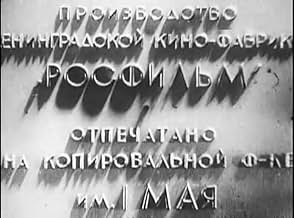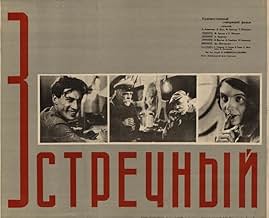Ajouter une intrigue dans votre langueDuring the first Five Year Plan in the USSR, an elderly worker in a Leningrad turbine factory comes under the influence of a saboteur planning to wreck production goalsDuring the first Five Year Plan in the USSR, an elderly worker in a Leningrad turbine factory comes under the influence of a saboteur planning to wreck production goalsDuring the first Five Year Plan in the USSR, an elderly worker in a Leningrad turbine factory comes under the influence of a saboteur planning to wreck production goals
Photos
Mariya Pototskaya
- Ego mat
- (as M. Pototskaya)
Leonid Alekseev
- Direktor zavoda
- (as A. Alekseev)
Fyodor Slavskiy
- Master
- (as Fedor Slavski)
Histoire
Le saviez-vous
- AnecdotesZoya Fyodorova'!s debut.
- ConnexionsFeatured in Fejezetek a film történetéböl: A szovjet hangosfilm 1930-1953 (1990)
Commentaire à la une
Vstrechnyy, usually interpreted as Counterplan, also known by the alternative titles Passer-by, Encounter and Turbine No. 50,000 was made for the Leningrad Rosfilm studio and co-directed by Fridrikh Ermler and Sergei Yutkevich.
The plot concerns the foiling of an attempt by 'wreckers' to sabotage the Leningrad turbine factory in which they work, though on the evidence of this film, there is more talking, vodka consumption and meetings than actual work taking place.
Interest today will mainly lie in the music score to the film, composed by Dmitri Shostakovich, his fourth effort in the genre and following on from New Babylon, Alone and The Golden Mountains, this last also directed by Ermler and Yutkevich and also co-starring Boris Tenin.
Two songs were especially composed, 'Song of the Meeting initially played over the film's opening credits and 'How Long will my Heart Ache'. 'Song of the Meeting' proved enormously popular, equally so in the West as well as the Soviet Union and it was later arranged as 'United Nations on the March' with new words by Harold Rome and climaxed the Hollywood film 'Thousands Cheer' (MGM, 1943).
Shostakovich recycled the tune in a number subsequent compositions, including the films Michurin (1949) and Moscow, Cheryomushki (1962). 'Song of the Meeting' has been recorded (Delos DE 3313, Mikhail Lukonin, baritone and Yuri Serov, piano - 2004) also the three known orchestral excerpts (Russian Disc RD CD 10 018, Byelorussian Radio & TV Symphony Orchestra conducted by Walter Mnatsakanov - 1997).
For a more detailed discussion on this and other films with music by Shostakovich, see Dmitri Shostakovich: A Life in Film, written by John Riley and published by I. B. Tauris, London and New York in the series Kinofiles Film Companion, 2004.
The plot concerns the foiling of an attempt by 'wreckers' to sabotage the Leningrad turbine factory in which they work, though on the evidence of this film, there is more talking, vodka consumption and meetings than actual work taking place.
Interest today will mainly lie in the music score to the film, composed by Dmitri Shostakovich, his fourth effort in the genre and following on from New Babylon, Alone and The Golden Mountains, this last also directed by Ermler and Yutkevich and also co-starring Boris Tenin.
Two songs were especially composed, 'Song of the Meeting initially played over the film's opening credits and 'How Long will my Heart Ache'. 'Song of the Meeting' proved enormously popular, equally so in the West as well as the Soviet Union and it was later arranged as 'United Nations on the March' with new words by Harold Rome and climaxed the Hollywood film 'Thousands Cheer' (MGM, 1943).
Shostakovich recycled the tune in a number subsequent compositions, including the films Michurin (1949) and Moscow, Cheryomushki (1962). 'Song of the Meeting' has been recorded (Delos DE 3313, Mikhail Lukonin, baritone and Yuri Serov, piano - 2004) also the three known orchestral excerpts (Russian Disc RD CD 10 018, Byelorussian Radio & TV Symphony Orchestra conducted by Walter Mnatsakanov - 1997).
For a more detailed discussion on this and other films with music by Shostakovich, see Dmitri Shostakovich: A Life in Film, written by John Riley and published by I. B. Tauris, London and New York in the series Kinofiles Film Companion, 2004.
Meilleurs choix
Connectez-vous pour évaluer et suivre la liste de favoris afin de recevoir des recommandations personnalisées
Détails
- Durée1 heure 55 minutes
- Couleur
- Mixage
- Rapport de forme
- 1.37 : 1
Contribuer à cette page
Suggérer une modification ou ajouter du contenu manquant

Lacune principale
By what name was Vstrechnyy (1932) officially released in Canada in English?
Répondre

























